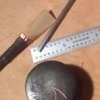Open lips a little and re-check playing pressure with chanter. Excessive rushes or wires, etc. obstructing the bore can also cause octave jumping and gurgles, especially in lower notes and make low notes sound too flat. (Hegarty)
Regulator Reed Issues
Search Tips:
- To search for a particular note, such as "D", enter "D note" (Quotes are not required).
- To find all, reload the page or delete all search terms and click "apply".
Reed is squeaking or jumping octave when chanter is playing in high octave. Tenor and middle regulators, all notes. (Regulator)
Reed is breaking on upper notes, I.e. dropping in pitch. Tenor and middle regulator. (Regulator)
-
Head scraped too much near back. Thin lips by sanding. Open lips a little wider. Re-check playing pressure against chanter. Regulator notes should not require excessive pressure. (Hegarty)
Low notes persistently flat when upper notes correct. (Regulator)
-
Note holes may be in wrong position. (Hegarty)
Lower notes excessively sharp when top notes correct. (Regulator)
-
Insert tuning pin or rush/wire extending to position opposite to or a little above note hole to be tuned. Slight changes can be achieved by turning the tuning pin slightly to left or right or up or down, I.e. pushing in or withdrawing the pin for fine adjustment. (Hegarty)
Bass Regulator Jumping the Octave. (Regulator)
-
Reed too closed, reed lips too strong, bridle too far down. Head not scraped down far enough. Staple possibly too big. Leaky lips. (Hegarty)
General Configuration (Regulator)
-
A bigger more shaved and opened reed encourages a responsive first octave and discourages the second octave which is what you want in a regulator. (Britton)
Sharpen a Note (Regulator)
-
If any one note is flatter than it ought to be, relative to the others, cut away some of the rush in the vicinity of that note's hole. (Quinn)
Flatten a Note (Regulator)
-
If it is necessary to flatten a particular note, you may add material to the rush by wrapping thread around it in the vicinity of the note's hole, or by applying small lumps of wax to the rush. It may be necessary to experiment with the location of the added material relative to the toneholes, as adding or subtracting material in one location to control the pitch of one note may have an effect on the pitch and/or clarity of another note elsewhere. (Quinn)
Pitch (Regulator)
-
Pitch is, among other things, determined by acoustic impedance. Just as a larger bore will sound a higher note than a smaller bore of the same length, other factors being equal, the smaller the obstruction in the bore, the higher the note will be because there will be less impedance. (Quinn)
Gurgle in Low Notes (Regulator)
-
If the rush occupies too much space in the bore, the lower notes may gurgle and crack. If this happens, use a wider reed to bring the pitch of the regulator down sufficiently, and use a smaller rush. (Quinn)
Tuning (Regulator)
-
Apart from the rush, tuning may be adjusted to a remarkable extent by varying the length of the regulator's bore. In some cases, the regulator cap may be pulled out a few millimeters to lengthen the effective bore column, or it may be necessary to insert a cork or cotton tampon into the bottom of the bore to effectively shorten it. The sweet spot will vary for different reeds, but often what seems to be an impossible regulator may be made quite docile by taking the time to find the bore length that provides the best match for the pipe and reed combination. If you find it is necessary to shorten the bore, pack cotton around the tuning pin so that it will extend up the bore the desired amount and yet still allow the tuning pin to move freely in and out.
